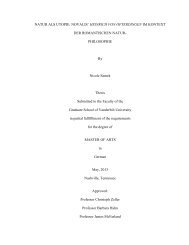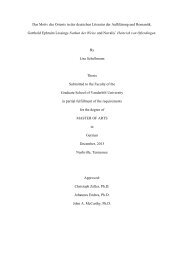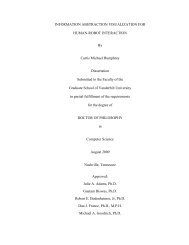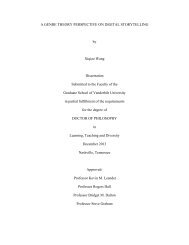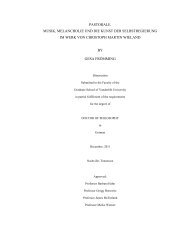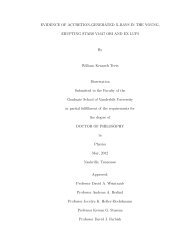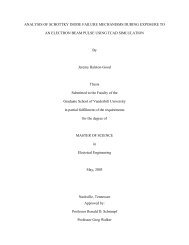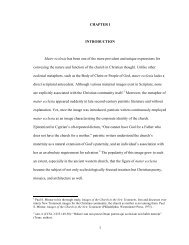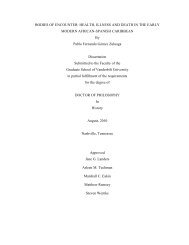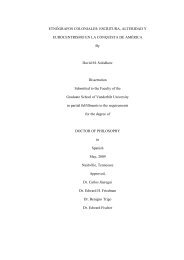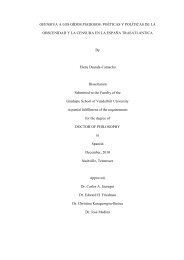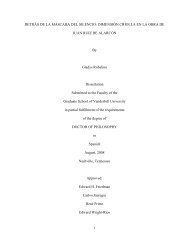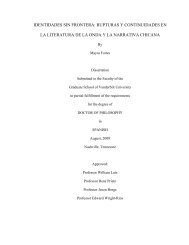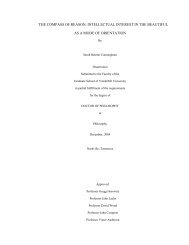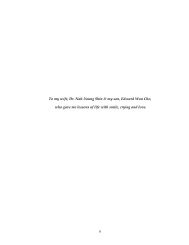THE DEATH OF DIONYSOS - ETD - Vanderbilt University
THE DEATH OF DIONYSOS - ETD - Vanderbilt University
THE DEATH OF DIONYSOS - ETD - Vanderbilt University
You also want an ePaper? Increase the reach of your titles
YUMPU automatically turns print PDFs into web optimized ePapers that Google loves.
We have already answered the last question. Rather than tell their charges that<br />
they are wrong, the Abbé and his shadow faculty facilitate the realization of their pupils<br />
wishes, so that the latter might learn from experience their error, even drink it to the bitter<br />
dregs (495). 28 Wilhelm learns more from Natalie, a graduate of the Tower school, about<br />
the pedagogical theory of the Abbé, who, rather than the youthful Wilhelm–in an<br />
unromantic reversal of Wordsworth–plays “Nature’s Priest” in the novel. 29 She recalls his<br />
fundamental precepts, “‘daß die Erziehung sich nur an die Neigung anschließen müsse’”<br />
[“‘that all education should build on inclination’”]; and that man was meant to be active:<br />
“‘das Erste und Letzte am Menschen sei Tätigkeit, und man könne nichts tun, ohne die<br />
Anlage dazu zu haben, ohne den Instinkt, der uns dazu treibe’” (520). [“‘the most<br />
important thing (for a human) is to be active, but one cannot engage in any activity<br />
without the necessary predisposition or the instinct impelling us in that direction’” (EAB<br />
319).] She adds that the Abbé was critical of ambiguity and confusion that prevailed in<br />
childhood education: “‘sie erregt Wünsche, statt Triebe zu beleben, und anstatt den<br />
wirklichen Anlagen aufzuhelfen, richtet sie das Streben nach Gegenständen, die so oft mit<br />
der Natur, die sich nach ihnen bemüht, nicht übereinstimmen’” (Ibid.). [“‘it arouses<br />
desires rather than active impulses, and instead of helping to develop predispositions, it<br />
directs our activity toward objects, which are often out of line with the minds that are so<br />
taken up with them’” (Ibid.).]<br />
“Trieb” or instinct here is contrasted with desire, which can obscure or be mistaken<br />
for an individual’s real capacities and potential. Paired with its verb form treiben, Trieb<br />
suggests that authentic activity is determined less by its results than by the instinct or drive<br />
that motivates it. The necessary assumption, of course, is that a child will be inclined by<br />
28 Some time after his initiation ceremony, when Wilhelm reflects on the Abbé’s intervention in his<br />
own life, he comments to Natalie on the peculiar way that “‘dieser merkwürdige Mann’” [“‘that<br />
remarkable man’”] exercised influence: “‘und mich, wo nicht geleitet, doch wenigstens eine<br />
Zeitlang in meinen Irrtümern gestärkt hat’” (521). [“‘and if he has not precisely guided me<br />
according to his fashion, he has at least encouraged me for a time in my mistakes’” (EAB 319, my<br />
italics).]<br />
29 “The Youth, who daily farther from the east / Must travel, still is Nature’s Priest”. See William<br />
Wordsworth, “Intimations of Immortality from Recollections of Early Childhood”, in: The<br />
Poetical Works of William Wordsworth, vol. IV (Oxford: Clarendon Press, 1947), pp. 279-85 (l.<br />
72-73).<br />
25



